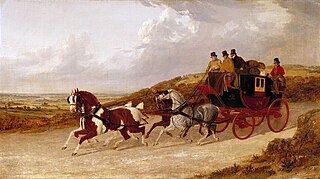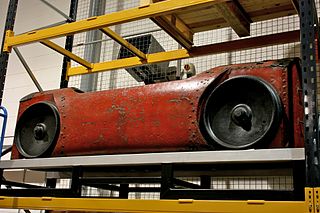
Postmaster General of the United Kingdom was a Cabinet ministerial position in HM Government. Aside from maintaining the postal system, the Telegraph Act 1868 established the Postmaster General's right to exclusively maintain electric telegraphs. This would subsequently extend to telecommunications and broadcasting.

A Travelling Post Office (TPO) was a type of mail train used in Great Britain and Ireland where the post was sorted en route, used from 1830 to 1996, with non-TPO mail trains ending in 2024.

The Manchester and Leeds Railway was a British railway company that built a line from Manchester to Normanton where it made a junction with the North Midland Railway, over which it relied on running powers to access Leeds. The line followed the valley of the River Calder for much of the way, making for easier gradients but by-passing many important manufacturing towns. Crossing the watershed between Lancashire and Yorkshire required a long tunnel. The line opened throughout in 1841.

The South Australia Act 1834, or Foundation Act 1834 and also known as the South Australian Colonization Act, was an Act of the Parliament of the United Kingdom which provided for the settlement of a province or multiple provinces on the lands between 132 degrees east and 141 degrees of east longitude, and between the Southern Ocean, and 26 degrees south latitude, including the islands adjacent to the coastline.

The Parsonages (Amendment) Act 1838 was an Act of Parliament in the United Kingdom, signed into law on 4 July 1838. It amended the Parsonages Act 1838, passed that May, by correcting a verbal omission in section 7.

The Fires Prevention Act 1838 or the Fires Prevention (Metropolis) Act 1838 was an Act of the Parliament of the United Kingdom. It amended the provisions of the Fires Prevention Act 1785, which related to manufactories of tar, pitch and turpentine, by enacting that the penalty of £100 inflicted to the owners or occupiers of such buildings by that Act would only be applied when the building was within 75 feet of another building. If the adjacent building was occupied by the same tenant, and the whole premises were more than 75 feet from any other building, the penalty would not apply. It also established that no person would be liable for any penalties under that Act until January 1839, with proprietors or occupiers of such buildings remaining exempt until August 1840.

The Debtors (Scotland) Act 1838, sometimes the Personal Diligence Act, was an act of Parliament in the United Kingdom, signed into law on 16 August 1838. It amended the law of Scotland in matters relating to personal diligence - how the person or property of a debtor could be secured – arrestments and poindings. The effect was to simplify the form of proceedings and reduce their expense.

The Criminal Lunatics (Ireland) Act 1838 was an act of Parliament in the United Kingdom, signed into law on 11 June 1838. It was one of the Lunacy (Ireland) Acts 1821 to 1890.

The Vagrancy Act 1838 was an Act of Parliament in the United Kingdom. It amended the Vagrancy Act 1824 to provide that any person discharged from custody pending an appeal against a conviction under that Act who did not then reappear to prosecute the appeal could be recommitted. It also provided that the penalty established by that Act for exposing indecent prints in a street or highway would extend to those who exposed the same material in any part of a shop or house.

The Grand Jury (Ireland) Act 1838 was an Act of Parliament in the United Kingdom, signed into law on 27 July 1838. It established that bills of indictment laid before grand juries should be endorsed with the names of the witnesses, and empowered the juries to administer oaths or affirmations to the witnesses, which were to be taken under the normal penalties of perjury for falsehood.

The House of Commons Qualification Act 1838 was an Act of Parliament in the United Kingdom, signed into law on 27 July 1838.

The West Indian Prisons Act 1838 was an Act of Parliament in the United Kingdom, signed into law on 4 August 1838.

The Quakers and Moravians Act 1838 was an Act of Parliament of the United Kingdom, signed into law on 10 August 1838. Prior to this Act, Quakers and Moravians had been able to give an affirmation in lieu of an oath where one was required; for example, when giving evidence in court. This Act extended that privilege to those who were previously members of these groups and had seceded from them, retaining the conscientious objection to oaths. Any person choosing to make an affirmation under this Act was required to give a declaration to that extent, and would remain subject to the normal penalties of perjury for falsehood.
The Festiniog Railway Letter Service is an officially authorised service within the United Kingdom railway system for posting and transmission of letters, and under certain circumstances also delivering the letters directly to intended recipients. The service operates on the Ffestiniog Railway and the Welsh Highland Railway in North Wales and similar services are operated on the Talyllyn Railway and other heritage railways in the UK. The service was also offered until 1984 by British Railways as successors to the many constituent railway companies that had in 1891 signed an agreement with the G.P.O. and it was BR that regulated the terms and the charges in conjunction with the post office.

A mail coach is a stagecoach that is used to deliver mail. In Great Britain, Ireland, and Australia, they were built to a General Post Office-approved design operated by an independent contractor to carry long-distance mail for the Post Office. Mail was held in a box at the rear where the only Royal Mail employee, an armed guard, stood. Passengers were taken at a premium fare. There was seating for four passengers inside and more outside with the driver. The guard's seat could not be shared. This distribution system began in Britain in 1784. In Ireland the same service began in 1789, and in Australia it began in 1828.

The Arbroath and Forfar Railway (A&FR) was a railway that connected Forfar with the port town of Arbroath, in Scotland.
The London and Southampton Railway was an early 4 ft 8+1⁄2 instandard gauge railway company between London and Southampton, in England. It opened in stages from 1838 to 1840 after a difficult construction period, but was commercially successful.

The General Post Office (GPO) was the state postal system and telecommunications carrier of the United Kingdom until 1969. Established in England in the 17th century, the GPO was a state monopoly covering the dispatch of items from a specific sender to a specific receiver ; it was overseen by a Government minister, the Postmaster General. Over time its remit was extended to Scotland and Ireland, and across parts of the British Empire.

The London Pneumatic Despatch Company was formed on 30 June 1859, to design, build and operate an underground railway system for the carrying of mail, parcels and light freight between locations in London. The system was used between 1863 and 1874.

The Hackney Carriages, Metropolis Act 1838 regulated and set up a licensing system for hackney carriages in London, namely the Office of the Registrar of Metropolitan Public Carriages








